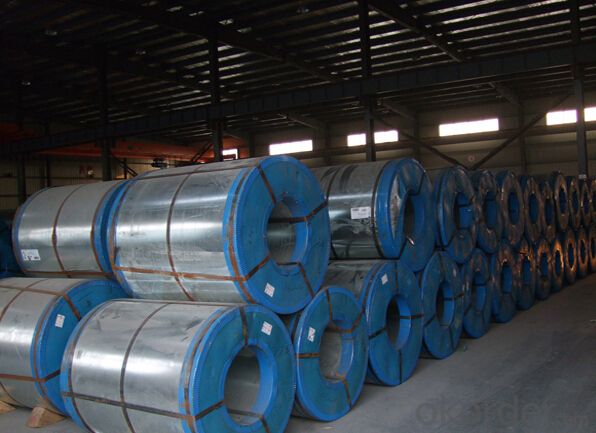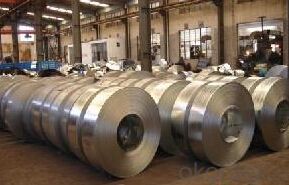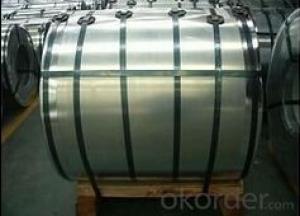High Quality Galvanized Steel Sheet Gi Coil
- Loading Port:
- Tianjin
- Payment Terms:
- TT OR LC
- Min Order Qty:
- 25 m.t.
- Supply Capability:
- 10000 m.t./month
OKorder Service Pledge
OKorder Financial Service
You Might Also Like
Basic Info.
Model NO.:ST010
Surface Treatment:Galvanized
Certification:ISO, SGS, BV, RoHS, IBR
Technique:Cold Rolled
Standard:ASTM, JIS, GB, AISI, DIN
Application:Packing,Gutter Ect.
Edge:Mill
Stock:Stock
Steel Grade:Q195
THK:0.13-3mm
Width:10mm-550mm
Inner Diameter:200mm to 600mm
Export Markets:Global
Additional Info.
Trademark:TRANDA
Packing:Wood Pallets
Standard:OEM
Origin:China
Production Capacity:30000 Tons Each Month
Product Description
1. Thickness: 0.18-1.5mm;
2. Width: 50-914mm;
3. Hardness: 380MPa-450MPa;
4. Specification: 0.35*50, 0.4*45, 0.4*65, 0.4*68, etc.;
5. Surface waxed and edges deburred;
6. Standard: As per buyers' specifications among Q195-Q345B in the GB standard;
7. Package: Inner is protect humidity-proof waw paper, medium is plastic film, outer is sackcloth or compound paper packing, or as per customer's requirements.
| Standard | AISI, ASTM, BS, DIN, GB, JIS, etc |
| Grade | SGCC, DX51D, DX53D, DX54D, etc |
| Thickness | 0.14-2.5mm |
| Width | less than 600mm |
| Inner Diameter | 508/610mm |
| Coil Weight | 1.5-4.0T |
| Zinc Coating | 60g/m 2 -180g/m 2 |
| Spangle State | regular spangle, small spangle, big spangle, non-spangle |
| Surface Treatment | Chromate, Oil, Lacquer Seal, Phosphating, etc |


FAQ
1.What's your MOQ?
25MT, it is for one container.
2.Do you have QC teams?
Yeah, sure, our QC team is very important, they will keep the quality control for our products.
3. What's your normal delivery time?
Our delivery time about 10-20days for standard sizes, if you have other requirements like hardness and width ,it is about 20-40days. But don't worry ,we also try our best for the delivery time ,because time longer and our cost is higher.
4.Are the products tested before shipping?
Yes, all of our PPGI and GI was qualified before shipping. We test every batch every day.
- Q:How are steel coils used in the manufacturing of doors and windows?
- Steel coils are used in the manufacturing of doors and windows by being processed into flat sheets or strips, which are then cut, shaped, and formed into various components such as frames, panels, and reinforcements. The steel coils provide strength, durability, and stability to the final products, ensuring high-quality doors and windows that can withstand different weather conditions and provide security to buildings.
- Q:I don't know it is low alloy steel or high allow steel or medium carbon steel
- Pretty sure it's low alloy steel, it's harder to smelt as it can contain up to 50% of other elements.
- Q:What are the different methods of coil recoiling for steel coils?
- There are several methods of coil recoiling for steel coils, including slitting, rewinding, and recoiling. Slitting involves cutting the coil into narrower strips, while rewinding involves unwinding the coil and rewinding it onto a new spool. Recoiling, on the other hand, is the process of rewinding the coil onto the same spool. These methods allow for the customization of coil width and length to meet specific requirements and facilitate easier handling and transportation.
- Q:How do steel coils contribute to the energy infrastructure sector?
- Steel coils play a vital role in the energy infrastructure sector by providing the necessary materials for the construction and maintenance of various energy-related structures and equipment. Firstly, steel coils are widely used in the production of pipelines, which are the lifelines of the energy industry. These pipelines transport oil, natural gas, and other energy resources over long distances, ensuring a steady supply to power plants and other energy facilities. Steel coils are used to manufacture seamless and welded pipes that possess high strength, durability, and resistance to corrosion, making them suitable for handling the harsh conditions of energy transportation. In addition to pipelines, steel coils are used in the production of storage tanks for oil, natural gas, and other fuels. These tanks are crucial for storing large quantities of energy resources, ensuring a continuous supply even during periods of high demand. Steel coils are utilized to fabricate the tank shells, providing the necessary strength and structural integrity to withstand the pressure and environmental factors associated with energy storage. Furthermore, steel coils are instrumental in the construction of power plants and other energy infrastructure facilities. They are used to manufacture structural components such as beams, columns, and supports, which provide the foundation and stability required for the safe operation of these facilities. Steel coils also contribute to the production of equipment such as turbines, generators, and transformers, which are essential for converting energy into usable forms and distributing it to end-users. Moreover, steel coils are utilized in the construction of transmission towers and electrical grids. These structures and networks are responsible for transmitting electricity from power plants to residential, commercial, and industrial consumers. Steel coils are used to manufacture the towers and poles that support high-voltage transmission lines, ensuring their stability and reliability in transmitting electricity over long distances. In summary, steel coils are indispensable in the energy infrastructure sector as they provide the necessary materials for the construction, maintenance, and operation of pipelines, storage tanks, power plants, transmission towers, and electrical grids. Their strength, durability, and resistance to corrosion make them an ideal choice for withstanding the demanding conditions of the energy industry, thereby ensuring a reliable and efficient energy supply to meet the growing needs of society.
- Q:Is the product of mild steel environmentally friendly? does it produce any emissions?The same question for leather aswell.
- Steel just rusts, it doesn't produce any emissions just sitting there. They even make architectural steel called Corten to rust to a nice patina. If you consider how the steel was made in the first place, a great big NO! Steel making requires massive amounts of electricity plus it gives off some nasty fumes in the liquid state. Leather itself doesn't emit much of anything, but the dyes might. Again though, if you look at how it's made, tanning leather is right up there with steel mills and paper mills for pollution, some of the worst.
- Q:What are the different grades of steel used in manufacturing steel coils?
- There are several different grades of steel that are commonly used in manufacturing steel coils. These grades include carbon steel, stainless steel, and high-strength low-alloy steel (HSLA). Each grade has its own unique properties and characteristics, which make them suitable for specific applications in various industries.
- Q:What are the benefits of using stainless steel coils?
- Using stainless steel coils in various applications offers multiple advantages. Firstly, stainless steel coils are renowned for their exceptional strength and durability, making them highly resistant to corrosion, rust, and stains. As a result, they can withstand harsh environmental conditions, both indoors and outdoors, ensuring their longevity and reducing the need for frequent replacements, ultimately saving costs in the long term. Furthermore, stainless steel coils provide excellent heat resistance, as they can endure high temperatures without warping or compromising their structural integrity. This makes them ideal for applications involving extreme heat or thermal cycling, such as industrial furnaces or heating systems. Another benefit of utilizing stainless steel coils lies in their versatility. Stainless steel is a highly adaptable material that can be easily molded into various shapes and sizes, allowing for customization and flexibility in design. Consequently, stainless steel coils can meet specific requirements across different industries, including construction, automotive, aerospace, and household appliances. In addition to their physical properties, stainless steel coils are favored for their hygienic qualities. Being non-porous, stainless steel resists bacteria, mold, and other contaminants, making it an excellent choice for applications demanding strict cleanliness and hygiene standards, such as the food and beverage industry or medical equipment. Lastly, stainless steel coils are environmentally friendly. They can be fully recycled, melted down, and repurposed to create new products, reducing waste and conserving resources. This sustainability aspect makes stainless steel coils an eco-conscious choice for numerous industries. Overall, the benefits of utilizing stainless steel coils encompass their strength, durability, heat resistance, versatility, hygiene, and environmental friendliness. These qualities make stainless steel coils a reliable and cost-effective solution for a wide range of applications.
- Q:what happened to all the steel beams from the WTC buildings? did anyone do any forensic analysisof any of the steel?
- some of the steel was recycled into a warship. I am not sure at what you are trying to get at with the forensic analysis of the steel. There is no conspiracy involving the towers outside of planes crashing into them despite what a lunatic fringe want you to think.
- Q:What are the challenges in coil recoiling?
- Coil recoiling, which is also known as coil winding, brings about a range of challenges that depend on the specific application and requirements. Some of the common hurdles encountered in coil recoiling are as follows: 1. Precision and accuracy: Achieving precise and accurate winding is vital for optimal coil performance. It is crucial to maintain consistent tension throughout the winding process, ensure proper alignment, and control the speed in order to prevent variations in the electrical properties of the coil. 2. Wire management: Managing the wire during the recoiling process can be difficult. The wire may be fragile, prone to tangling, or have specific handling requirements, such as being sensitive to magnetic or thermal influences. Employing proper wire management techniques, such as tension control, wire guide systems, and spooling mechanisms, is necessary to prevent wire damage and ensure uniform winding. 3. Space limitations: In many cases, coils need to fit within specific space constraints. Designing and winding coils to fit compact spaces can be challenging, particularly when considering the required number of turns, wire size, insulation, and any additional components or structures that may need to be incorporated. 4. Material selection: The selection of the appropriate wire and insulation material is crucial for optimal coil performance and durability. Factors such as electrical conductivity, thermal properties, mechanical strength, and chemical resistance must be taken into account to ensure that the coil can withstand the operating conditions and environmental factors it will encounter. 5. Heat dissipation: Coils often generate heat during operation, especially in high-power applications. Efficient heat dissipation is crucial to prevent overheating and ensure the longevity of the coil. Techniques such as designing the coil with proper ventilation, utilizing cooling mechanisms, or incorporating heat sinks are employed to address this challenge. 6. Quality control: Ensuring consistent quality in coil recoiling can be challenging due to factors such as variations in wire properties, operator skill, equipment calibration, and environmental conditions. Robust quality control measures, such as conducting regular inspections, performing electrical tests, and monitoring process parameters, need to be implemented to maintain consistent coil performance. In summary, coil recoiling demands meticulous attention, precision, and adherence to specific requirements in order to overcome the challenges and produce high-quality coils that meet the desired performance criteria.
- Q:Got small (.177) bb gun for fun with my son...From the manual:'Steel shot will fire at a higher velocity then lead shot with with the same muzzle energy. As a result, more caution is required when using steel shot because of a greater hazard of ricochet. Lead, because of its lower velocity, usually has less penetrating power and is less likely to ricochet.'Are you agree with that? ;)
- steel is made of iron mainly (and carbon) its density is 7.86 g/cm? approximately. and lead has density=11.4 g/cm?. so, if have same volume and shape steel will have less mass and thus will have greater velocity for same muzzle energy. I agree the manual. for more information on ricochet
1. Manufacturer Overview |
|
|---|---|
| Location | |
| Year Established | |
| Annual Output Value | |
| Main Markets | |
| Company Certifications | |
2. Manufacturer Certificates |
|
|---|---|
| a) Certification Name | |
| Range | |
| Reference | |
| Validity Period | |
3. Manufacturer Capability |
|
|---|---|
| a)Trade Capacity | |
| Nearest Port | |
| Export Percentage | |
| No.of Employees in Trade Department | |
| Language Spoken: | |
| b)Factory Information | |
| Factory Size: | |
| No. of Production Lines | |
| Contract Manufacturing | |
| Product Price Range | |
Send your message to us
High Quality Galvanized Steel Sheet Gi Coil
- Loading Port:
- Tianjin
- Payment Terms:
- TT OR LC
- Min Order Qty:
- 25 m.t.
- Supply Capability:
- 10000 m.t./month
OKorder Service Pledge
OKorder Financial Service
Similar products
New products
Hot products
Related keywords




























